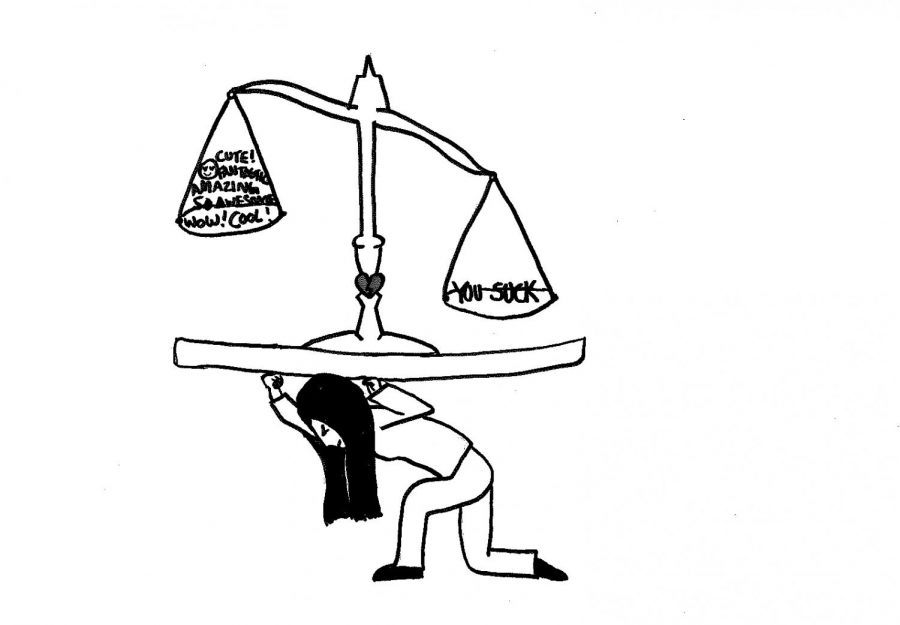Social Media’s Unavoidable Dark Side
Almost anywhere you go, you can see people staring down at their personal devices. Many take pictures of their surroundings and themselves. Maybe you have even been one of those people snapping a photo. If you have, let me ask you a question: Did you post those photos online?
A study by Stacy Nagai focused on female self-image reveals that seeing posts that are not directly derogatory–like those of models– can be detrimental to users’ body image and self-esteem.
People have a tendency to post about only the positive aspects of their lives, and we often come to believe that this is the only aspect of them. We start to think of our lives and selves as inferior. Comparison in person is extreme enough, but on sites like Instagram, you cannot look anywhere without seeing something to yearn for.
Comparative mindsets are at the root of social media, and you can’t remove the root without killing the plant entirely.
Indirect, unintentional negativity isn’t the only problem.
Rude comments and microaggressions, the ever so common insults disguised as jokes, are amplified in the media. They are given a larger audience with a smaller risk of facing consequences. Numerous studies have been run on this topic, and a recent survey has shown that 70 percent of students in a Bedford Middle School class have friends who were targets of hate speech at one point or another.
If you have ever had to help a friend through a hard time, you may know that it is emotionally taxing to you as well. The remaining 30 percent reported that they themselves have been targeted once or twice, leaving no student untouched.
Though most people who are singled out receive more positive comments than negative comments, a concept called the negativity bias, something I am sure most people have been subject to at one point or another, clouds our judgment.
Roy F. Baumeister from Case Western Reserve University explains, “When equal measures of good and bad are present, however, the psychological effects of bad ones outweigh those of the good ones.”
A lighthearted example of this effect would be the tendency for a single negative review on a product to influence us more than a number of positive ones. Online, one comment can really damage a person.
Nevertheless, most people will stubbornly argue that the media is beneficial to social health. There is significantly more good than bad, after all. If 30 percent of people have been targeted, the majority haven’t been directly. A researcher from Michigan State University’s Department of Media & Information believes that the opposite is true. Keith Hampton testifies that social media is an important tool for some to develop empathy, and for others to communicate their concerns and find support. He testifies that the Internet is a positive source where people can seek help and reach out to others.
While this can be true, the Internet is nowhere near completely welcoming. Two people who have come under relentless attack are YouTuber Eugenia Cooney and Korean idol Sulli.
Eugenia suffered from an eating disorder, and due to the focus of her channel, she showed her thin body quite frequently. One of her viewers commented, “Get this in your head you f****** w****, if I ever see you, you are going to get f****** shot by me and my crew, we will f****** drive by you, and then say goodbye to your worthless life.”
In contrast, Sulli was quite open about her mental health, asking for help instead of denying her poor state. She was the kind of person to do what felt right to her, but to many uptight netizens, she was rude.
An example of a comment targeting her would be, “If you don’t have any shame or morality, you’re no different from a pig.” While Eugenia made a recovery and returned to the media recently, Sulli took her life on Oct. 14, 2019. Instead of getting the idealistic support that Hampton described, they were alienated.
We all claim to learn from our mistakes, so please, learn. Though communities tend to unite after a shock, they soon revert to turning on each other. If we take away nothing else from Sulli’s hardships, at least remember that words can cut sharper than knives. Don’t glance at a negative comment and play it off as a joke. Because to the victim, it isn’t.



